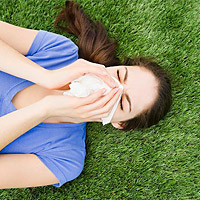We looked to our friends at the CDC for some safety tips to keep in…
Summer Cold or Simply Summer Allergies?

Summer is the time for sunning, swimming, and grilling — not for being miserable with a cold. Here’s how to tell if you have a summer cold or summer allergies, along with tips to cope.
No matter what the season, a virus finds the weather perfect to invade your respiratory tract — leaving you sneezing, coughing, and down with a cold.
A cold is a cold is a cold, regardless of when one suffers from it. But in the summer months, when the winter doldrums and associated illnesses seem ages away, it’s easy to write off a cold as just summer allergies. The two are very different conditions — and if you pay close attention to your symptoms, you can usually figure out which is which.
Summer Colds-
A cold is a virus and is different from allergies. The seasonal difference is due to different virus strains in summer and winter. So just because most people don’t catch a cold in the summer doesn’t mean that you can’t — or that you didn’t.
Colds, or upper respiratory infections occur all year round, but are more prevalent in the colder months. The main difference between summer colds and winter colds is how commonly they occur. But a summer cold just feels worse somehow — it feels wrong to get a cold in the sunny summer weather.
So cold-prevention tips are important year-round, even when the sun is beating down. The most important precaution is hand-washing, and not sharing cups or utensils.
Summer Allergies –
The common cold and summer allergies have a lot in common. They can both cause:
- Runny or stuffy nose
- Congestion
- Coughing
- Fatigue
- Headaches
Sometimes, it can be hard to tell them apart, especially if someone has not had problems with allergies previously. Often, allergies have more watery, runny nose with lots of sneezing, itchy, watery eyes and can change based on physical location (for example, may get better if someone leaves the outdoors and goes into an air-conditioned, air-filtered house).
Seasonal allergies, such as allergies to grasses and weeds, also strike about the same time each year (depending on the allergy) and persist throughout allergy season. A simple summer cold usually goes away within about 10 days — with or without common cold treatment — and tends not to cause itchy eyes or nose like allergies do.
10 Tips to Cope With a Summer Cold
Treatment for a cold is the same whether summer or winter. Here are some cold remedies to help you beat a summer cold and get back to enjoying the heat:
- Take an over-the-counter (OTC) decongestant to unclog a stuffy nose.
- Use a saline spray to irrigate the nose and keep mucus loose.
- Take an OTC pain reliever (like Tylenol) to reduce fever and manage pain.
- Use cough drops and throat lozenges to manage that pesky dry cough.
- Gargle with warm salt water to soothe a sore throat.
- Don’t take an antibiotic.
- Allow your body to rest — get plenty of sleep, and avoid strenuous exercise.
- Drink plenty of water to stay hydrated in the heat.
- Don’t smoke.
- Head to the doctor if you don’t get relief within two days, or you are wheezing.
Allergies, on the other hand, may respond best to OTC antihistamines or prescription nasal sprays.
Though these medications may help you feel better and cope with a summer cold, all medications have side effects, and some people prefer the effects of the URI to the effects of the medications. These medicines do not make the URI go away any quicker, they just help you breathe a bit easier or have less of a headache while your body is busy fighting off the infection.
Sources
http://www.everydayhealth.com/cold-flu/summer-cold-or-simply-summer-allergies.aspx



